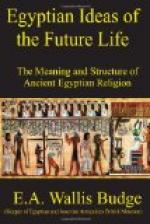of thousand; yea, millions of years to pass over;
[this] thou doest, and then thou dost sink to rest.
Thou puttest an end to the hours of the night, and
thou dost count them, even thou; thou endest them
in thine own appointed season, and the earth, becometh
light, Thou settest thyself before thy handiwork in
the likeness of R[=a]; thou risest in the horizon.’
“Osiris; the scribe Ani, declareth
his praise of thee when thou
shinest, and when thou risest at dawn
he crieth in his joy at thy
birth, saying:—
“’Thou art crowned with the majesty of thy beauties; thou mouldest thy limbs as thou dost advance, and thou bringest them forth without birth-pangs in the form of R[=a], as thou dost rise up in the celestial height. Grant thou that I may come unto the heaven which is everlasting, and unto the mountain where dwell thy favoured ones. May I be joined unto those shining beings, holy and perfect, who are in the underworld; and may I come forth with them to behold thy beauties when thou shinest at eventide, and goest to thy mother Nut. Thou dost place thyself in the west, and my hands adore [thee] when thou settest as a living being. [Footnote: i.e., “because when thou settest thou dost not die.”] Behold, thou art the everlasting creator, and thou art adored [as such when] thou settest in the heavens. I have given my heart to thee without wavering, O thou who art mightier than the gods.’
“A hymn of praise to thee, O thou who risest like unto gold, and who dost flood the world with light on the day of thy birth. Thy mother giveth thee birth, and straightway thou dost give light upon the path of [thy] Disk, O thou great Light who shinest in the heavens. Thou makest the generations of men to flourish through the Nile-flood, and thou dost cause gladness to exist in all lands, and in, all cities, and in all temples. Thou art glorious by reason of thy splendours, and thou makest strong thy KA (i.e. Double) with, divine foods, O thou mighty one of victories, thou Power of Powers, who dost make strong thy throne against evil fiends—thou who art glorious in Majesty in the Sektet boat, and most mighty in the [=A]tet [Footnote: The Sun’s evening and morning boats respectively.] boat!” This selection may be fittingly closed by a short hymn [Footnote: From the Papyrus of Nekht (Brit. Mus. No. 10,471).] which, though, of a later date, reproduces in a brief form all the essentials of the longer hymns of the XVIIIth dynasty (about B.C. 1700 to 1400).
“Homage to thee, O thou glorious Being, thou who art dowered [with all sovereignty]. O Temu-Harma-chis, [Footnote: The evening and morning sun respectively.] when thou risest in the horizon of heaven, a cry of joy cometh forth, to thee from the mouth of all peoples, O thou beautiful Being, thou dost renew thyself in thy season in the form of the Disk within thy mother Hathor; [Footnote: Like Nut, a goddess of the sky, but particularly




